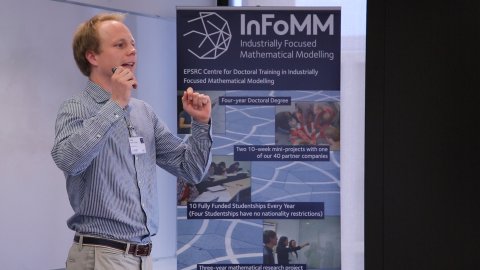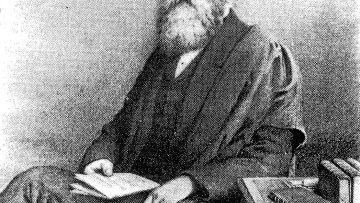Finiteness properties of subgroups of direct products of surface groups
Abstract
We will explain a result of Bridson, Howie, Miller and Short on the finiteness properties of subgroups of direct products of surface groups. More precisely, we will show that a subgroup of a direct product of n surface groups is of finiteness type $FP_n$ if and only if there is virtually a direct product of at most n finitely generated surface groups. All relevant notions will be explained in the talk.
16:30
Counting Designs
Abstract
A Steiner Triple System on a set X is a collection T of 3-element subsets of X such that every pair of elements of X is contained in exactly one of the triples in T. An example considered by Plücker in 1835 is the affine plane of order three, which consists of 12 triples on a set of 9 points. Plücker observed that a necessary condition for the existence of a Steiner Triple System on a set with n elements is that n be congruent to 1 or 3 mod 6. In 1846, Kirkman showed that this necessary condition is also sufficient. In 1974, Wilson conjectured an approximate formula for the number of such systems. We will outline a proof of this
conjecture, and a more general estimate for the number of Steiner systems. Our main tool is the technique of Randomised Algebraic Construction, which
we introduced to resolve a question of Steiner from 1853 on the existence of designs.
The Mathematical Institute at the University of Oxford has been awarded a new Regius Professorship as part of the Queen’s 90th birthday celebrations.
Twelve new Regius Professorships – rare, sovereign-granted titles recognising the most outstanding levels of research in their fields – were awarded to leading British universities to mark the milestone. This is the first time since 1842 that Oxford has been awarded a Regius Professorship.
Black Holes and Higher Derivative Gravity
Abstract
Our latest Oxford Mathematicians are the three Savilian Professors of Geometry who dominated Oxford’s mathematical scene during the Victorian era: Baden Powell (1796–1860), Henry John Stephen Smith (1826–83) and James Joseph Sylvester (1814–97). None was primarily a geometer, but each brought a different contribution to the role. Find out more.






